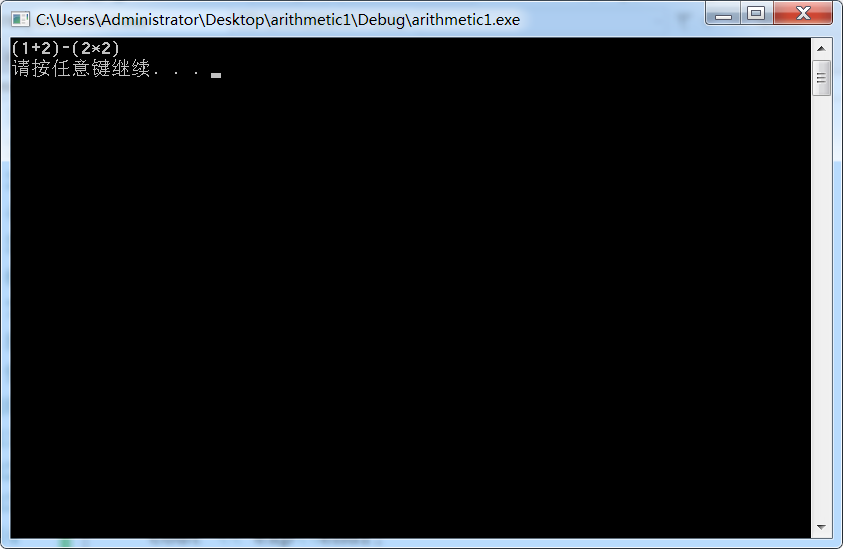2017《面向对象程序设计》课程作业五
github连接:https://github.com/Travaill/RefactoringArithmetic.git
一、一个有待修改的类图

二、程序功能
- 选择中文,英文,德语法语,日语五种语言
- 程序能接收用户输入的整数答案,并判断对错
- 程序结束时,统计出答对、答错的题目数量
三、代码规范
- 函数的命名必须使用英文单词,不使用拼音缩写
- 函数的命名如果一个单词的必须首字母大写,如果多个单词的用下划线隔开
- 程序结构清析,简单易懂,单个函数的程序行数不得超过100行。
- 要随意定义全局变量,尽量使用局部变量。
- 函数的旁边必须注释上本函数的功能
- 禁止GOTO语句。
- 源文件头部应进行注释,列出:生成日期、作者、模块目的/功能等。
示例:
示例:
示例:
下面这段源文件的头注释比较标准,可以不局限于此格式,但上述信息要包含在内。示例:
示例:
下面这段源文件的头注释比较标准,可以不局限于此格式,但上述信息要包含在内。示例:
下面这段源文件的头注释比较标准,可以不局限于此格式,但上述信息要包含在内。
说明:Description一项描述本文件的内容、功能、内部各部分之间的关系及本文件与其它文件关系等。/************************************************************
FileName: test.cpp
Author:
Version :
Date:
Description: // 模块描述
Version: // 版本信息
Function List: // 主要函数及其功能
- -------
History: // 历史修改记录
< author > < time > < version > < desc >
David 96/10/12 1.0 build this moudle ***********************************************************/
History是修改历史记录列表,每条修改记录应包括修改日期、修改者及修改内容简述。
- 函数头部应进行注释,列出:函数的目的/功能、输入参数、输出参数、返回值等
示例:
/*************************************************
Description: // 函数功能、性能等的描述
Input: // 输入参数说明,包括每个参数的作 用、取值说明及参数间关系。
Output: // 对输出参数的说明。
Return: // 函数返回值的说明
Other // 其它说明
*************************************************/
- 函数名以大写字母开头,采用谓宾结构(动名),且应反映函数执行什么
操作以及返回什么内容。
- 类、结构、联合、枚举的命名须分别以C、S、U、E开头,其他部分遵从一般变量命名规范。
四、代码展示
类Expression
#include<string>
using namespace std;
class CExpression
{
public:
void InitExpression();
void GetExpression(string &str);
friend bool JudgeExpression(string str);
friend bool JudgeResult(double res);
private:
string exp;
double res;
int RandomNumber(int low, int high);
char RandomOperation();
double CalculateResult(string str);
void CalculatePolynomial();
int OpeRank(char x);
};
类Control
#include<string>
using namespace std;
class CControl
{
public:
bool JudgeExpression(string str);
bool JudgeResult(double res);
bool GetKeyAndExit();
void StatisticalResult();
private:
int wrong;
int right;
};
类File
#include<string>
using namespace std;
class CFile
{
public:
int ReadFile();
bool JudgeIfGet();
void OutputFile();
private:
string inputFilePath;
string outputFilePath;
};
类File的派生类 Resouce
class CResource:public CFile
{
public:
private:
string resouceFilePath;
string recouce[8];
};
已经实现了生成表达式的功能
#include<string>
using namespace std;
class CExpression
{
public:
void InitExpression();
void GetExpression(string &str);
friend bool JudgeExpression(string str);
friend bool JudgeResult(double res);
private:
string exp;
double res;
int RandomNumber(int low, int high);
char RandomOperation();
#include"Expression.h"
#include<sstream>
void CExpression::GetExpression(string &str)
{
str = exp;
}
int CExpression::RandomNumber(int low, int high) //生成[low,high]随机数
{
return (rand() % (high - low + 1) + low);
}
char CExpression::RandomOperation() //生成四则运算符
{
char ope;
switch (RandomNumber(1,4))
{
case 1:ope = '+'; break;
case 2:ope = '-'; break;
case 3:ope = '*'; break;
case 4:ope = '/'; break;
}
return ope;
}
void CExpression::InitExpression()
{
stringstream ss;
string str[2] = { "" };
for (int i = 0; i < 2; i++)
{
int mode = RandomNumber(1, 3);
if (mode == 1)
{
ss << '(' << RandomNumber(1,10) << RandomOperation() <<RandomNumber(1,10) << ')';
}
if (mode == 2)
{
ss << RandomNumber(1, 10) << RandomOperation() << RandomNumber(1, 10);
}
if (mode == 3)
{
ss << RandomNumber(1, 10);
}
str[i] = ss.str();
ss.str("");
}
ss << str[0] << RandomOperation() << str[1];
string str1 = ss.str();
ss.str("");
exp = str1;
}
#include<stdlib.h>
#include<iostream>
#include<time.h>
#include<string>
#include"Expression.h"
using namespace std;
int main()
{
srand((unsigned)time(NULL));
CExpression obj;
obj.InitExpression();
string exp;
obj.GetExpression(exp);
cout << exp<<endl;
system("pause");
return 0;
}
五、提交日志证明

六、程序测试

七、个人感受
本次作业进行完全的代码重构,暂时只重构了一个生成表达式的部分,想先请教一下老师和YC学长,这样重构是否符合面对对象的思想。后续会逐渐完成其他部分的重构。
八、对栈知识的探索
要使用标准库的栈和队列,首先得添加头文件
#include < stack >
定义栈:
stack< int > curStack;
栈的操作:
curStack.empty() 如果栈为空返回true,否则返回false;
curStack.size() 返回栈内元素的大小;
curStack.pop() 从栈顶弹出一个成员;
curStack.push() 向栈内压入一个成员;
curStack.top() 返回栈顶,但不删除成员;